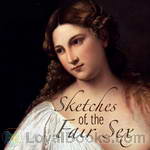|
Books Should Be Free Loyal Books Free Public Domain Audiobooks & eBook Downloads |
|
|
Books Should Be Free Loyal Books Free Public Domain Audiobooks & eBook Downloads |
|
Psychology Books |
|---|
|
Book type:
Sort by:
View by:
|
By: James Hayden Tufts (1862-1942) | |
|---|---|
 The Ethics of Coöperation
The Ethics of Coöperation
| |
By: Helen Ekin Starrett (1840-1920) | |
|---|---|
 Letters to a Daughter and A Little Sermon to School Girls
Letters to a Daughter and A Little Sermon to School Girls
Helen Ekin Starrett, journalist, mother of two daughters, grandmother of seven granddaughters and teacher to many young girls at the Starrett School for Girls offers lessons in life and religion to girls about to "pass out from the guardianship of home into life with its duties and trials". | |
By: Anonymous | |
|---|---|
 Sketches Of The Fair Sex
Sketches Of The Fair Sex
Sketches of the fair sex, in all parts of the world. To which are added rules for determining the precise figure, the degree of beauty, the habits, and the age of women, notwithstanding the aids and disguise of dress. It is our design to present a pleasing and interesting miscellany, which will serve to beguile the leisure hour, and will at the same time couple instruction with amusement. We have used but little method in the arrangement: Choosing rather to furnish the reader with a rich profusion... | |
By: Max Heindel (1865-1918) | |
|---|---|
 The Rosicrucian Mysteries
The Rosicrucian Mysteries
A primer for those interested in the basic philosophy, beliefs & secrets of the Rosicrucians. | |
By: Herbert J. Hall (1870-1923) | |
|---|---|
 The Untroubled Mind
The Untroubled Mind
A very wise physician has said that “every illness has two parts—what it is, and what the patient thinks about it.” What the patient thinks about it is often more important and more troublesome than the real disease. What the patient thinks of life, what life means to him is also of great importance and may be the bar that shuts out all real health and happiness. The following pages are devoted to certain ideals of life which I would like to give to my patients, the long-time patients who have especially fallen to my lot. | |
By: Thomas Troward (1847-1916) | |
|---|---|
 The Edinburgh Lectures on Mental Science
The Edinburgh Lectures on Mental Science
Thomas Troward was a divisional Judge in British-administered India. His avocation was the study of comparative religion. Influences on his thinking, as well as his later writing, included the teachings of Christ, Islam, Hinduism, and Buddhism. After his retirement from the judiciary in 1896, Troward set out to apply logic and a judicial weighing of evidence in the study of matters of cause and effect. The philosopher William James characterized Troward’s Edinburgh Lectures on Mental Science as "far and away the ablest statement of philosophy I have met, beautiful in its sustained clearness of thought and style, a really classic statement... | |
By: H. G. Wells (1866-1946) | |
|---|---|
 Anticipations
Anticipations
Wells considered this book one of his most important, a natural follow-up to such works as his Man of the Year Million and The Time Machine. His goal was to get people to think and act in new ways. The book starts with a look at how humans get along socially and how they carry out their business ventures. It then discusses how these elements influence others, such as politics, the world of work, and education. H. G. tried to make clear how the current social order was disintegrating without preparing another to take its place. He then traced the roots of democracy, which in its present state he saw as unworkable. Instead, he proposed a new republic. He also critiqued modern warfare. | |
By: Unknown (1866-1936) | |
|---|---|
 Palmistry for All
Palmistry for All
| |
By: Charles Godfrey Leland (1824-1903) (1824-1903) | |
|---|---|
 The Mystic Will
The Mystic Will
This book presents a method of developing and strengthening the faculties of the mind, through the awakened will, by a simple, scientific process possible to any person of ordinary intelligence | |
By: Samuel D. Gordon (1859-1936) | |
|---|---|
 Quiet Talks about Jesus
Quiet Talks about Jesus
So far as I can find out, I have no theory about Jesus to make these talks fit into. I have tried to find out for myself what the old Book of God tells about Him. And here I am trying to tell to others, as simply as I can, what I found. It was by the tedious, twisting path of doubt that I climbed the hill of truth up to some of its summits of certainty. I am free to confess that I am ignorant of the subject treated here save for the statements of that Book, and for the assent within my own spirit to these statements, which has greatly deepened the impression they made, and make... | |
By: Edgar Thurston (1855-1935) | |
|---|---|
 Omens and Superstitions of Southern India
Omens and Superstitions of Southern India
This book deals mainly with some aspects of what may be termed the psychical life of the inhabitants of the Madras Presidency, and the Native States of Travancore and Cochin. | |
By: A Highland Seer | |
|---|---|
 Tea-Cup Reading and Fortune-Telling by Tea Leaves
Tea-Cup Reading and Fortune-Telling by Tea Leaves
Reading the Cup is essentially a domestic form of Fortune-telling to be practiced at home, and with success by anyone who will take the trouble to master the simple rules laid down in these pages: and it is in the hope that it will provide a basis for much innocent and inexpensive amusement and recreation round the tea-table at home, as well as for a more serious study of an interesting subject, that this little guide-book to the science is confidently offered to the public. | |
By: Various | |
|---|---|
 The Journal of Abnormal Psychology, Volume 10
The Journal of Abnormal Psychology, Volume 10
MANUAL OF SURGERY, OXFORD MEDICAL PUBLICATIONSBY ALEXIS THOMSON, F.R.C.S.Ed.PREFACE TO SIXTH EDITION Much has happened since this Manual was last revised, and many surgical lessons have been learned in the hard school of war. Some may yet have to be unlearned, and others have but little bearing on the problems presented to the civilian surgeon. Save in its broadest principles, the surgery of warfare is a thing apart from the general surgery of civil life, and the exhaustive literature now available on every aspect of it makes it unnecessary that it should receive detailed consideration in a manual for students... | |
By: Unknown (1864-1929) | |
|---|---|
 Second Sight A study of Natural and Induced Clairvoyance
Second Sight A study of Natural and Induced Clairvoyance
| |
 Insights and Heresies Pertaining to the Evolution of the Soul
Insights and Heresies Pertaining to the Evolution of the Soul
| |
 How to Read the Crystal or, Crystal and Seer
How to Read the Crystal or, Crystal and Seer
| |
By: John Ruskin (1819-1900) | |
|---|---|
 Sesame and Lilies
Sesame and Lilies
Sesame and Lilies proposes and answers the questions, how, what and why to read in the context of how and why to live. About earlier and later editions of the book containing the first two lectures alone, Ruskin wrote: "...chiefly written for young people belonging to the upper or undistressed, middle classes; who may be supposed to have choice of the objects and command of the industries of their life... if read in connection with “Unto This Last” it contains the chief truths I have endeavored through all of my past life to display… and am chiefly thankful to have learned and taught... | |
By: Mohandas Karamchand Gandhi (1869-1948) | |
|---|---|
 Guide to Health
Guide to Health
Mahatma Gandhi, known today as a fascinating political leader and pacifist, also considered himself "something of an authority on matters of Health and Disease as well. Very few of us perhaps are aware that he is the author of quite an original little Health-book in Gujarati. [...] His views are of course radically different from the ordinary views that find expression in the pages of such books; in many cases, indeed, his doctrines must be pronounced revolutionary, and will doubtless be regarded by a certain class of readers as wholly impracticable... | |
By: Elliott O'Donnell (1872-1965) | |
|---|---|
 Some Haunted Houses of England and Wales
Some Haunted Houses of England and Wales
Old buildings necessarily have a history. It is not always a happy history and folklore abounds. Sometimes unhappy souls come back to haunt the current residents or their guests. Whether you believe in ghosts or not, these narratives provide a fascinating insight into the history of the buildings and the hysteria they may induce. - Summary by Lynne Thompson | |
By: Emory Adams Allen (1853-1933) | |
|---|---|
 Golden Gems of Life
Golden Gems of Life
Life is full of ups and downs, joys and trials. In this work, we are advised on how to deal with what fate deals us, the good and bad, the common and uncommon. Home, childhood, success and failure, perseverance, dignity, frugality, envy, charity... all these and more are explored in this 'guide to life'. - Summary by Lynne Thompson | |
By: Marion Harland (1830-1922) | |
|---|---|
 Marion Harland's Complete Etiquette
Marion Harland's Complete Etiquette
Haven't you always wondered how to properly accept a formal dinner invitation? Perhaps you have a débutante under your wing, in which case you need to make sure her appearance in society goes perfectly, to increase her chances of a brilliant match. And what exactly would be your duties as her chaperon? These and many other questions are expertly answered by Marion Harland in this little volume. - Summary by Carolin | |
By: Wilhelm Stekel (1868-1940) | |
|---|---|
 Depths of the Soul
Depths of the Soul
Wilhelm Stekel was an Austrian physician and psychologist and one of Freud’s earliest followers. This title, originally published in 1921, was the author’s favorite of his own work. Covering a variety of topics he takes a psychoanalytic look into The Depths of the Soul. | |
By: John Dewey (1859-1952) | |
|---|---|
 Human Nature And Conduct - Part 1, The Place of Habit in Conduct
Human Nature And Conduct - Part 1, The Place of Habit in Conduct
John Dewey, an early 20th Century American philosopher, psychologist, educational theorist saw Social Psychology as much a physical science as Biology and Chemistry. This project encompasses Part 1 of 4 of his book Human Nature and Conduct. Dewey's uses the word "HABIT" as a specialized catch-all word to describe how a person and his/her objective environment interact. This interaction is the basis for moral judgement. Dewey writes: "All habits are demands for certain kinds of activity; and they constitute the self.” In other places he also asserts that "Habits are Will." - Summary by William Jones, Soloist | |
By: Herbert Mayo (1796-1852) | |
|---|---|
 Popular Superstitions, and the Truths Contained Therein
Popular Superstitions, and the Truths Contained Therein
"In the following Letters I have endeavoured to exhibit in their true light the singular natural phenomena of which old superstition and modern charlatanism in turn availed themselves—to indicate their laws, and to develop their theory." In 14 letters, British physiologist Herbert Mayo is giving the reader an overview of popular superstitions of previous times, like vampirism, somnambulism or even ghost sightings, and exposing how in previous times they were treated with fear, ignorance and intolerance, often leading to crime, while he endeavours to give rational explanations for the phenomena with the goal to find treatments and cures for the afflicted. - Summary by Sonia | |
By: Theophrastus | |
|---|---|
 Characters Of Theophrastus
Characters Of Theophrastus
Theophrastus was an ancient Greek philosopher, successor to Aristotle in the Peripatetic School. He wrote on many topics: biology, geology, physics, metaphysics, psychology, ethics, logic – and more. His book Characters… contains thirty brief, vigorous, and trenchant outlines of moral types, which form a most valuable picture of the life of his time, and in fact of human nature in general. They are the first recorded attempt at systematic character writing. “Apart from slight variations of local coloring and institutions, the descriptions of the old Greek philosopher might apply almost as well to the present inhabitants of London or Boston as to the Athenians of 300 B... | |
By: Cesare Lombroso (1835-1909) | |
|---|---|
 Man of Genius
Man of Genius
Famous criminologist, anthropologist, and psychiatrist, Dr Lombroso, investigated the memetic anecdotal belief that genius is associated with degenerative symptoms, or may even be a version of insanity, and presented his findings as a fascinating and controversial theory that the creative and imaginative celebrities throughout history have also displayed what he termed as "atavistic" symptoms, or defects resembling what is commonly seen in the unwell. Citations of evidence are drawn from a rich variety... | |
By: Carl Gustav Jung (1875-1961) | |
|---|---|
 Collected Papers on Analytical Psychology
Collected Papers on Analytical Psychology
A collection of classical writings of Swiss psychologist Carl G. Jung, an influential thinker and the founder of analytical psychology. Written at intervals over a span of fourteen years, these selected articles and pamphlets contain many fascinating ideas that have become widely accepted psychological concepts nowadays, but had just started to develop at the time when the book was written. For instance, this is where Dr. Jung's ideas of introversion and extroversion, a contribution of vital importance to psychology, appeared for the very first time. Other topics explored include the concept of the unconscious, the study of psychological types, and the psychology of dreams. | |
By: Edward Summers Squier | |
|---|---|
 Etiquette Made Easy
Etiquette Made Easy
"A complete dictionary [sic] containing the right information for any and all occasions." - Summary by KevinS | |
By: Mary Wollstonecraft (1759-1797) | |
|---|---|
 Vindication Of The Rights Of Men, In A Letter To The Right Honourable Edmund Burke; Occasioned By His Reflections On The Revolution In France
Vindication Of The Rights Of Men, In A Letter To The Right Honourable Edmund Burke; Occasioned By His Reflections On The Revolution In France
Wollstonecraft's A Vindication of the Rights of Men attacks aristocracy and advocates republicanism. It was published in response to Edmund Burke's Reflections on the Revolution in France , which was a defence of constitutional monarchy, aristocracy, and the Church of England, and an attack on Wollstonecraft's friend, the Rev Richard Price. Hers was the first response in a pamphlet war that subsequently became known as the Revolution Controversy, in which Thomas Paine's Rights of Man became the rallying cry for reformers and radicals... | |
By: Booker T. Washington (1856-1915) | |
|---|---|
 Putting the Most Into Life
Putting the Most Into Life
The chapters in this little book were originally part of a series of Sunday Evening Talks given by the Principal to the students of the Tuskegee Normal and Industrial Institute. They have been recast from the second to the third person, and many local allusions have been cut out. They are now sent out, in response to repeated requests, to a larger audience than that to which they were first spoken. - Summary by Booker T. Washington | |
By: Josephine Turck Baker (1864-1942) | |
|---|---|
 Art of Conversation: Twelve Golden Rules
Art of Conversation: Twelve Golden Rules
Many of us find it challenging to speak to other people, for various reasons. Some of us are afraid of being called a bore. Others are worried that we will be accused of hogging attention. Many of us simply don't know what to talk about. This book is an entertaining and enlightening manual that may be able to help. Through a series of twelve dialogues between a man and a woman, we are introduced to twelve "golden rules" that will help us navigate the waters of interpersonal communication. He: Read by KevinS She: Read by Devorah Allen | |
By: Cordwainer Smith (1913-1966) | |
|---|---|
 Psychological Warfare
Psychological Warfare
Psychological warfare and propaganda have been used extensively in warfare since the earliest times. This book explores the functions, limitations, types, and history of psychological warfare through 1953. It was written by Paul Myron Anthony Linebarger, a US Army officer, a noted East Asia scholar, and an expert in psychological warfare, also known by the pseudonym Cordwainer Smith as a science fiction author. Linebarger had extensive experience with the practice and implementation of psychological warfare techniques in the field through his work with the Office of War Information, the Operation Planning and Intelligence Board, and the CIA... | |